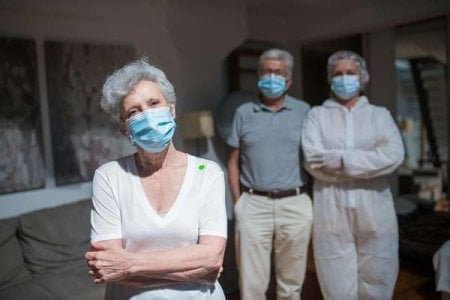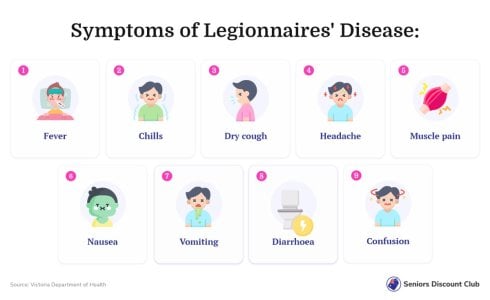Department of Health sounds alarm over Legionnaires' disease outbreak
By
Danielle F.
- Replies 10
As we navigate through the changing tides of health and wellness, it's crucial to stay informed about potential health threats that could affect our community.
Health authorities recently warned citizens about a dangerous disease outbreak putting lives at risk.
Victoria's Department of Health started monitoring a worrying surge in Legionnaires' disease cases in the region.
Legionnaires' disease is a severe form of pneumonia caused by a bacteria called Legionella.
There has been a 'significant increase' in reported cases since Friday, with 22 confirmed and another six suspected cases.
The majority of these cases involve adults over the age of 40.
The Legionnaires' disease could manifest as a chest infection with the following symptoms:
These symptoms could lead to severe and life-threatening conditions, especially for those with pre-existing medical conditions, compromised immune systems, or smokers.
Victoria's Department of Health emphasised that all cases were detected in metropolitan Melbourne, either through residents or visitors.
The findings pointed to a localised source of infection, which authorities are still identifying.
The strain that caused this outbreak, 'Legionella pneumophilia serogroup 1,' can be detected through a unitary antigen test.
Understanding where Legionnaires' disease comes from is crucial to prevention.
The bacteria could thrive in various environments, including potting mix and soils.
They're also present in natural water bodies such as rivers, lakes, and hot springs, as well as artificial systems like spas and warm water systems.
However, a more common source of infection is through contaminated air conditioning and cooling systems in large buildings.
Transmission occurs after inhaling fine droplets of water that contain the bacteria.
The Legionnaires' disease does not spread from person to person or by drinking contaminated water. The disease has an incubation period of ten days.
Anyone who has been in the affected areas and starts to develop the symptoms above should seek urgent medical care.
Here are some steps you can take to protect yourself from the outbreak:
If you or someone you know begins to show symptoms, don't hesitate to seek medical attention immediately.

Have you or someone you know been affected by Legionnaires' disease? How do you ensure your safety against such outbreaks? We invite you to share your thoughts and health tips in the comments below.
Health authorities recently warned citizens about a dangerous disease outbreak putting lives at risk.
Victoria's Department of Health started monitoring a worrying surge in Legionnaires' disease cases in the region.
Legionnaires' disease is a severe form of pneumonia caused by a bacteria called Legionella.
There has been a 'significant increase' in reported cases since Friday, with 22 confirmed and another six suspected cases.
The majority of these cases involve adults over the age of 40.
The Legionnaires' disease could manifest as a chest infection with the following symptoms:
- Fever
- Chills
- Cough
- Headache, and;
- Muscle aches and pains.
These symptoms could lead to severe and life-threatening conditions, especially for those with pre-existing medical conditions, compromised immune systems, or smokers.
Victoria's Department of Health emphasised that all cases were detected in metropolitan Melbourne, either through residents or visitors.
The findings pointed to a localised source of infection, which authorities are still identifying.
The strain that caused this outbreak, 'Legionella pneumophilia serogroup 1,' can be detected through a unitary antigen test.
Understanding where Legionnaires' disease comes from is crucial to prevention.
The bacteria could thrive in various environments, including potting mix and soils.
They're also present in natural water bodies such as rivers, lakes, and hot springs, as well as artificial systems like spas and warm water systems.
However, a more common source of infection is through contaminated air conditioning and cooling systems in large buildings.
Transmission occurs after inhaling fine droplets of water that contain the bacteria.
The Legionnaires' disease does not spread from person to person or by drinking contaminated water. The disease has an incubation period of ten days.
Anyone who has been in the affected areas and starts to develop the symptoms above should seek urgent medical care.
Here are some steps you can take to protect yourself from the outbreak:
- Be aware of the symptoms and monitor your health closely, especially if you've been in Melbourne recently.
- Practise good hygiene and wear protective gear like masks and gloves when handling potting mixes.
- Regularly maintain and clean any warm water systems using the manufacturer's instructions to prevent bacterial growth.
- Avoid exposure to areas where the Legionella bacteria could be present, especially if you have pre-existing respiratory conditions.
If you or someone you know begins to show symptoms, don't hesitate to seek medical attention immediately.
Key Takeaways
- Health authorities in Victoria issued an urgent warning due to an outbreak of Legionnaires' disease in Melbourne.
- The Department of Health confirmed 22 cases and six suspected cases since Friday, mainly in adults over 40.
- Investigations are ongoing to determine the outbreak's source and urged the public to seek medical care if they exhibit symptoms such as fever, chills, and cough.
- The disease was linked to 'Legionella pneumophilia serogroup 1' and is transmitted through fine water droplets.
Last edited:









